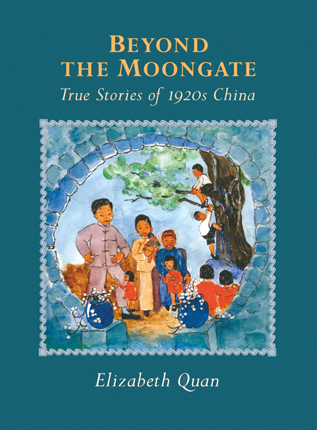| Beyond the moongate : true stories of 1920s China Author: Quan, Elizabeth | ||
| Price: $6.50 | ||
Summary:
In the 1920s the Lee King family - father, mother, and six children, aged ten months to seven years - traveled from their home in Canada, across the Pacific Ocean, to inland China. They discover a foreign and astonishing world where life has stayed the same for centuries.
Reviews:
Kirkus Reviews (02/15/13)
School Library Journal (-) (05/01/13)
Booklist (04/15/13)
Full Text Reviews:
Booklist - 04/15/2013 In Once Upon a Full Moon (2007), Quan wrote about her family’s journey from Canada to her parents’ home in China. Now, they have arrived, and the vignettes that make up this book describe what it was like in the 1920s for this family of five children to make their home in a country where everything is different. The book is beautifully designed—creamy pages host the one-page events, which are more scraps of memory than stories. Quan, now 90, also provides charming, childlike illustrations that extend the text. The tone of the telling is neutral, whether Quan and her sister are running into a pair of pigs, or pirates are invading the village. A bride comes to the village and paints the girls’ faces, much to their grandmother’s anger. But two events demand further explanation in an afterword: the fates of Grandmother and a baby brother born in China, who is not allowed to return home when the family’s visa runs out after two years. A tender remembrance that will reach today’s readers. - Copyright 2013 Booklist.
School Library Journal - 04/20/2013 Gr 2–4—A sequel to Once Upon a Full Moon (Tundra, 2007), this collection of memories recalls the two years Quan's Chinese-Canadian family spent living with her grandmother in China. Each memory is told on a spread, with a few paragraphs of text and a full-page watercolor painting. These recollections are largely disjointed and incomplete. For instance, in "Chinese School," Quan mentions that she ranked almost last in her class. She states that "Papa could not have been proud of me. I so hoped that Buddha and Kwan Yin…would look down on me… with understanding and sympathy!" But the story ends there, so readers don't know how her father actually reacted. The flap copy and introduction are especially problematic, promising a "China forever gone" where "life hasn't changed for centuries." These nostalgic tales do little to address the great upheaval and change created by the political and economic realities of the time. When things such as bandits and pirates are mentioned, they are treated as a fun adventure instead of the terrorizing forces they were. While children such as Quan might not have realized the realities of the situation, or what was happening outside their compound, this lack of information greatly lessens the value of the book for modern readers.—Jennifer Rothschild, Arlington County Public Libraries, VA - Copyright 2013 Publishers Weekly, Library Journal and/or School Library Journal used with permission.



